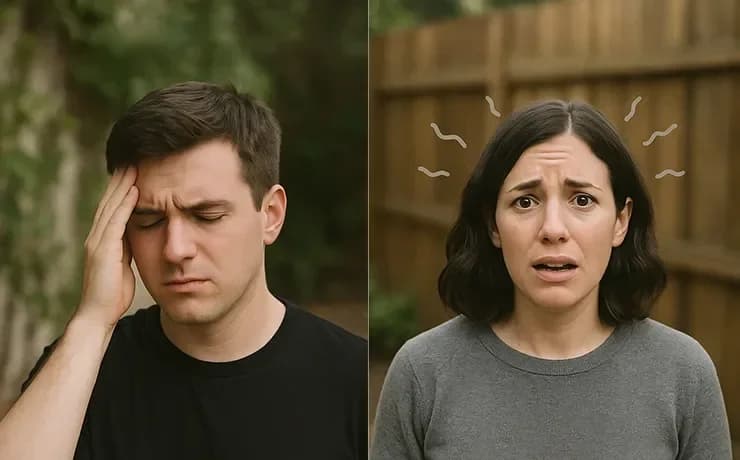Depression vs Anxiety: Key Differences and How to Seek Help

Mental health is just as important as physical health, yet many people find it hard to understand or talk about conditions like depression and anxiety. These two conditions often occur together, but they have different symptoms and treatments. Knowing the differences can help you or your loved ones get the right care sooner.
At Central Pharmacy, we want to support your mental well-being by providing clear information and guidance. In this post, we’ll explain the key differences between depression and anxiety, discuss how they are treated, and offer tips on when to seek help.
What Is Depression?
Depression is a mood disorder that causes persistent feelings of sadness, hopelessness, and a loss of interest in activities. It affects how you feel, think, and handle daily tasks.
Common Symptoms of Depression:
-
Feeling sad, empty, or tearful most of the day
-
Loss of interest in hobbies and social activities
-
Fatigue or low energy
-
Changes in appetite or weight
-
Difficulty concentrating or making decisions
-
Feelings of worthlessness or guilt
-
Sleep problems—either insomnia or sleeping too much
-
Thoughts of death or suicide
Depression can range from mild to severe and may last for weeks, months, or even years without treatment.
What Is Anxiety?
Anxiety is a feeling of worry, nervousness, or fear that can be mild or intense. While everyone experiences anxiety at times, an anxiety disorder causes frequent and overwhelming anxiety that interferes with daily life.
Common Symptoms of Anxiety:
-
Excessive worrying about everyday situations
-
Restlessness or feeling “on edge”
-
Difficulty concentrating or mind going blank
-
Muscle tension or headaches
-
Rapid heartbeat or shortness of breath
-
Sweating or trembling
-
Sleep difficulties
-
Avoidance of feared situations
Anxiety disorders include generalized anxiety disorder, panic disorder, social anxiety, and phobias.
How Are Depression and Anxiety Different?
While they share some symptoms like sleep problems and difficulty concentrating, depression and anxiety are distinct conditions.
| Feature | Depression | Anxiety |
|---|---|---|
| Main Feeling | Sadness, hopelessness | Worry, fear, nervousness |
| Energy Level | Low or fatigued | Often restless or tense |
| Focus of Thoughts | Negative thoughts about self or future | Excessive worry about events or situations |
| Physical Symptoms | Changes in appetite, sleep disturbances | Muscle tension, rapid heartbeat |
| Behavior | Withdrawal and lack of interest | Avoidance and hypervigilance |
It’s also possible to experience both depression and anxiety at the same time, which is called comorbid depression and anxiety.
Treatment Options for Depression and Anxiety
Both depression and anxiety can be effectively treated with a combination of therapies and medications.
Medications
Medications used to treat depression and anxiety generally work by balancing brain chemicals that affect mood and stress. They may include:
-
Antidepressants that help improve mood and reduce anxiety
-
Anti-anxiety medications for short-term relief of acute symptoms
-
Other medications to manage specific symptoms or side effects
Medications must be prescribed by a healthcare provider and taken as directed. It can take several weeks to feel the full effect.
Therapy and Lifestyle Changes
Medications are often combined with talk therapy (such as cognitive behavioral therapy), lifestyle changes, and self-care strategies like:
-
Regular exercise
-
Healthy diet
-
Adequate sleep
-
Stress management techniques like meditation or yoga
-
Building strong social support
At Central Pharmacy, our pharmacists can offer medication counseling, help manage side effects, and provide support resources.
When to Seek Help
If you or someone you know experiences:
-
Persistent feelings of sadness or worry
-
Difficulty functioning at work, school, or home
-
Thoughts of self-harm or suicide
-
Physical symptoms that interfere with daily life
It’s important to seek professional help promptly. Early treatment can improve outcomes and quality of life.
How Central Pharmacy Supports Your Mental Health
We are here to support your mental health journey by offering:
-
Private, confidential consultations with trained pharmacists
-
Guidance on medication management and adherence
-
Refill synchronization and reminder services
-
Referrals to mental health providers and support groups
-
Educational resources to help you understand your condition
Your mental health matters, and we’re here to help you every step of the way.
Final Thoughts
Depression and anxiety are common but treatable conditions. Understanding the differences helps you get the right care faster. If you’re struggling, don’t hesitate to reach out for help—from your healthcare provider, therapist, or trusted pharmacist.
Contact Central Pharmacy today to speak with a pharmacist about your medications, questions, or mental health concerns.
Snippet From our blog
Explore helpful tips, expert insights, and the latest health updates on our blog. Find practical advice and resources to support a healthier life.